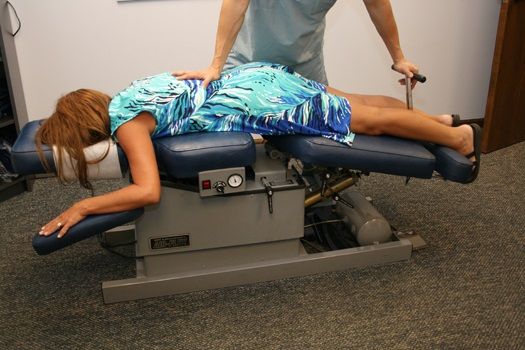The Cox Flexion Distraction Technique (also referred to as the Cox® Technic) was developed by Dr. James M. Cox as a gentle, non-force adjustment procedure to help the spine heal naturally. It is based on principles of both chiropractic and osteopathy, a combination that often provides fast relief from low back and leg pain, without the need for surgery.
The goal of Flexion Distraction is to decompress the vertebrae by applying gentle stretching or traction to the lower spine. The Cox Flexion-Distraction technique is performed on a special table (designed by Dr. Cox), which has moving parts to effectively separate the different parts of the spine. The Cox Table has movable sections to separately support the head and legs, allowing the patient to flex in many directions and thus extend the spine. The combination of this special adjustment table and very gentle pressure utilizes flexion-distraction and decompression to increase the disc height between vertebrae, decompressing the spinal column and restoring the spinal joints to their proper alignment and range of motion. The chiropractor can adjust the different sections of the table to neutralize the effects of gravity and then apply gentle pressure to the affected areas as they move through a more normal range of motion. Movements are repetitive and usually slow, without any quick thrusts or undue pressure.
The technique has been found to:
- reduce intradisc pressure
- widen the spinal canal
- improve range of motion in spinal joints and in arms, legs, and shoulders
- improve posture
- reduce pressure on spinal nerves
- increase circulation
- improve nerve communication
The Cox Flexion Distraction Technique is utilized by an estimated 56% of chiropractors and has been successfully used to treat pain in the lower back, legs, neck, and arms. It can also reduce the pain of herniated, slipped, or ruptured discs, sciatica, and other conditions. Because of its gentle, non-force nature, is often used with patients who are recovering from spinal surgery or who are in rehabilitation. Not only is the process pain-free, but many patients also report that they find the procedure pleasant, and relaxing. The technique has become recognized as an effective methodology for relieving pain, often without the need for spinal surgery.




